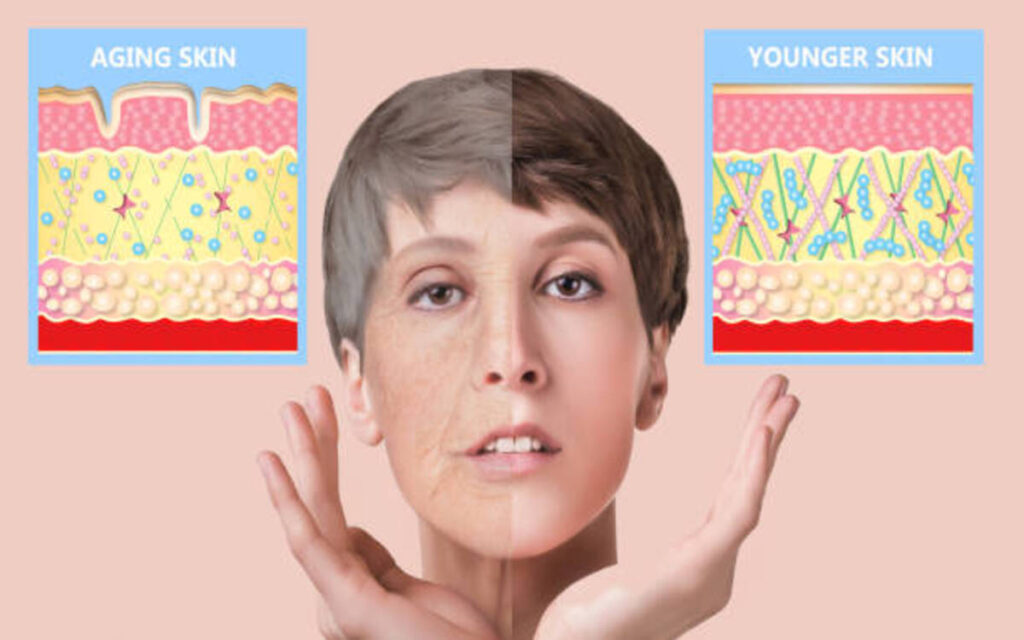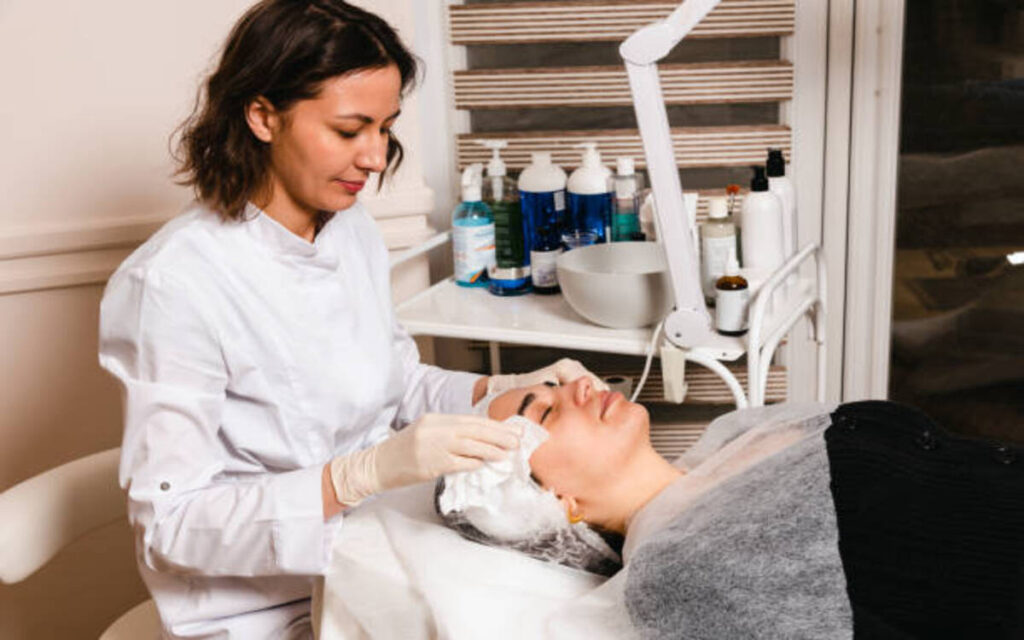How Collagen Affects Skin Elasticity Over Time – Dermatologists Don’t Want You to Know This One Simple Trick to Increase Collagen
Collagen is the most abundant protein in the human body, making up a large percentage of connective tissues like skin, tendons, ligaments, and cartilage.
As we age, collagen production begins to decline, leading to common signs of aging like wrinkles, sagging skin, and reduced skin elasticity.
Understanding the role of collagen in maintaining youthful skin and how to preserve collagen levels can help unlock the secrets to lasting skin elasticity and that sought-after “eternal youth” appearance.
The Role of Collagen in Skin Health
How Collagen Affects Skin Elasticity Over Time, collagen is a fibrous structural protein that makes up approximately 75-80% of our skin. It provides the underlying framework that gives skin its shape, contour, and resilience against stretching.
Skin elasticity, or the ability of skin to snap back after being pulled, depends greatly on adequate collagen levels and integrity.
Skin Layers and Collagen Distribution
Within the skin, collagen is found in high concentrations in the papillary dermis and reticular dermis layers. The papillary dermis is the upper layer just beneath the epidermis, containing thin collagen fibers that give skin its fine texture.
The reticular dermis lies underneath and consists of dense, thick collagen bundles providing structure and elasticity. The reticular dermis contains 90% of the collagen in the skin.
Factors Influencing Collagen Levels Over Time
Our collagen supply is dynamic and constantly breaking down and rebuilding on a daily basis. However, as we age a variety of factors cause a gradual decline in collagen production leading to deficiencies.
Aging and Collagen Production Decline
One of the most significant factors is intrinsic aging, as collagen synthesis rates decrease progressively after our 20s. By age 40, collagen production may decline by as much as 1% each year. Elderly skin can have 30% less collagen than young skin.
Environmental Impacts on Collagen Integrity
Extrinsic aging factors like sun exposure, pollution, and smoking also damage existing collagen. UV radiation breaks collagen bonds, smoking constricts tiny blood vessels restricting nutrient flow, and free radicals like pollution attack collagen.
Nutrition and Lifestyle Choices
Diet, hydration levels, exercise, and sleep can impact collagen turnover. Diets low in amino acids and antioxidants hinder collagen formation. Dehydration shrinks cells hampering collagen production, and lack of sleep accelerates aging.

Signs of Decreased Skin Elasticity Due to Collagen Loss
The progressive breakdown of collagen fibers over time manifests through various changes in skin appearance and elasticity. These signs can develop gradually but become more noticeable in mature skin.
Visible Signs of Collagen Depletion
- Wrinkles and Fine Lines – A classic sign of aging, wrinkles and creases appear as collagen support weakens and skin loses shape and structure. Areas with frequent muscle movements like the forehead and eyes show fine lines first.
- Sagging and Loss of Skin Tone – Declining collagen also reduces skin’s ability to bounce back. Gravity causes tissues to descend, leading to sagging jowls, eyelids, and loose skin on the neck, knees, elbows, and abdomen.
Understanding Skin Conditions Related to Collagen Loss
- Elastosis – This condition damages the elastic fibers in skin, which work together with collagen to maintain flexibility. The result is thick, leathery, wrinkled skin with impaired elasticity.
- Conditions Accelerating Collagen Breakdown – Certain skin disorders like eczema and rosacea increase collagenase enzymes which excessively degrade collagen in the skin.
Effects of Collagen Loss on Skin Elasticity
The deterioration of collagen has a direct impact on the suppleness, firmness, and elasticity of our skin over time.
- Signs of Reduced Skin Elasticity – Clinically, skin elasticity loss presents as an inability of the skin to return to its normal state after deformation along with impaired structure and function. Signs include pronounced wrinkles, visible pores, fragile skin, and loss of tone.
- Clinical Measures of Skin Elasticity Changes – Using devices to analyze skin mechanical properties, doctors can precisely quantify declines in collagen-related skin elasticity with age. Tests like the suction chamber method demonstrate elderly skin can have over 50% loss of elasticity vs youthful skin.
Collagen Levels and Skin Elasticity Over Time
There is a strong correlation between dwindling collagen supply and loss of resilient, springy skin over the years:
- How collagen levels decline with age, leading to loss of skin elasticity – From our 20s onwards, collagen production drops roughly 1% yearly. Existing collagen also deteriorates from environmental stressors and repeated muscle movements. With up to 30% reduction of total collagen, the skin progressively loses elasticity and the ability to retain a firm, smooth, plump appearance.
- The impact of decreased collagen on wrinkles and sagging skin – The depleted collagen matrix leads to excess skin that sags downward with gravity, forming wrinkles and folds. Thinning collagen fibers and decreased collagen renewal make the skin more prone to creasing with facial expressions and sleeping, causing etched lines.
Ways to Boost Collagen Production
Preserving our collagen supplies as we age requires a multi-pronged approach:
- Discussing the benefits of a healthy diet rich in collagen-promoting nutrients – Collagen synthesis relies on dietary amino acids like glycine, proline, and lysine. Fruits and vegetables containing Vitamin C are vital for collagen formation. Foods high in antioxidants combat free radicals that destroy collagen. A nutritious diet provides building blocks for ongoing collagen renewal.
- The use of skincare products and treatments that can stimulate collagen production – Topical treatments with peptides, retinoids, and antioxidants help stimulate new collagen growth in the skin. Professional microneedling and laser resurfacing prompt collagen remodeling by creating microscopic wounds. Therapies like ultrasound, radiofrequency, and infrared light also rev up collagen activity.
Strategies to Preserve and Boost Collagen Levels for Skin Elasticity
Comprehensive anti-aging skin regimens combine science-backed skincare, nutrition, and lifestyle habits to enhance collagen and maintain youthful skin elasticity.

Skincare Regimens for Collagen Support
Topical Treatments and Ingredients
- Retinoids – Derivatives of Vitamin A that increase collagen production in the dermis and thicken epidermal skin layers for smoother skin.
- Peptides – Amino acid chains that signal cells to synthesize more collagen. Palmitoyl pentapeptide is clinically shown to stimulate collagen growth.
- Antioxidants – Ingredients like niacinamide, Vitamin C, Vitamin E, resveratrol, and green tea neutralize collagen-damaging free radicals caused by UV and pollution.
- Growth Factors – Biologically active proteins that regulate collagen synthesis, demonstrated in studies to increase procollagen content.
- Hyaluronic Acid – Powerful humectant that retains moisture in the skin for increased collagen production, as collagen requires hydration.
Importance of Moisturization and Sun Protection
- Moisturizers – Hydrating skin optimizes the extracellular matrix environment for collagen renewal. Humectants like glycerin and emollients like shea butter keep skin hydrated.
- Sunscreens – Shielding skin from UV damage with broad-spectrum SPF prevents degradation of existing collagen from the sun’s rays.
Professional Treatments and Therapies
- Microneedling – Using small needles to create controlled micro-injuries to the skin elicits the body’s wound healing response and generates new collagen.
- Laser Resurfacing – Ablative lasers remove damaged outer skin layers while stimulating collagen remodeling and thickening the dermis.
- Ultrasound – Focused ultrasound waves initiate collagen regeneration and skin tightening through thermal effects boosting collagen and elastin.
- Radiofrequency – Heating fat layers prompts new collagen synthesis by dermal fibroblasts, shown to increase collagen density in the skin.
Dietary Supplements and Nutrition
- Collagen protein supplements – Hydrolyzed collagen peptides provide essential amino acids to encourage the body’s own collagen production.
- Vitamins A, C, E – These vitamins are cofactors in collagen synthesis reactions and protect against free radical damage.
- Hyaluronic acid pills – Oral hyaluronic acid supplements help hydrate skin cells from within to facilitate collagen generation.
Lifestyle Changes and Habits for Collagen Enhancement
Nutrition and Collagen-Rich Foods
- Protein-rich foods – Amino acid-containing proteins like meat, fish, eggs, bone broth, beans, nuts and seeds are building blocks for endogenous collagen synthesis.
- Fruits and vegetables – Citrus, berries, leafy greens, tomatoes, and red/yellow peppers provide collagen-boosting Vitamin C. Carotenoid antioxidants are found in carrots, sweet potatoes, and squash.
- Natural collagen sources – Poultry, eggshell membranes, bone broth, and marine sources like fish, shellfish, and seaweed contain collagen and stimulatory amino acids.
Exercise and its Influence on Collagen Production
- Weight-bearing exercise promotes collagen production by placing controlled micro-strains on tendons and ligaments.
- Muscle contraction during resistance training also stimulates collagen synthesis in tendons and muscle connective tissue.
- Cardiovascular exercise increases blood flow and nutrient delivery throughout the body, transporting collagen building blocks.

Dietary Sources of Collagen to Maintain Youthful Skin
Consuming natural collagen sources provides active protein fragments directly used for structural collagen fibers throughout the body. Collagen-based supplements are also growing in popularity.
- Bone broth – Simmering bones and connective tissue breaks down collagen, releasing amino acids like glycine and proline into the liquid broth.
- Eggs – The shells contain collagen-building proline and sulfur-containing proteins important for collagen cross-linking. Egg whites provide skin-enhancing biotin and methionine.
- Citrus fruits and berries – Oranges, lemons, limes, strawberries, blackberries, blueberries, raspberries, etc are high in Vitamin C needed for collagen formation. They also contain collagen-protective bioflavonoids.
- Collagen supplements – Collagen peptides and marine collagen derived from fish, bovine, or eggshell membranes are readily absorbed sources shown to improve skin hydration and elasticity.
- Vitamins A, C and antioxidants – These vitamins obtained from colorful plant foods protect and preserve collagen structures by neutralizing damaging free radicals.
Emerging Research and Future Directions
Cutting-edge studies are expanding our understanding of optimizing collagen for youthful skin:
- Innovations in Collagen Replacement – 3D bioprinting of human collagen constructs may enable collagen regeneration similar to natural matrices in the skin for wrinkle reduction.
- Genetic Factors in Collagen Synthesis – Research on genes involved in extracellular matrix homeostasis is shedding light on biological mechanisms regulating collagen formation and breakdown.
FAQs on How Collagen Affects Skin Elasticity Over Time
What are the benefits of using topical collagen on the skin?
Some studies indicate topical collagen can temporarily improve skin hydration, elasticity, and wrinkling by forming a protective surface film. However, collagen molecules are too large to penetrate deeply when applied topically.
How does marine collagen differ from other collagen sources in terms of skin health?
Marine collagen derived from fish is more absorbable due to low molecular weight and low allergenicity. It contains antioxidant amino acids not found in mammalian collagen. Clinical trials show marine collagen supplements improve skin elasticity, hydration, wrinkles and age spots.
Can oral collagen supplements improve skin elasticity, and how are they absorbed?
Yes, ingestible collagen peptides and hydrolyzed collagen have been shown to increase skin elasticity, hydration and dermal collagen density. Collagen supplements are enzymatically digested into small peptides that are absorbed through the intestines into the bloodstream for distribution.
What are the potential side effects associated with collagen supplements?
Collagen derived from common food sources like bovine, marine life and eggs are generally well tolerated, with few reports of adverse effects. Very high doses may potentially cause digestive upset in sensitive people. Those with shellfish allergy should avoid marine collagen.
How long does it typically take to see changes in skin elasticity after starting collagen supplementation?
Research indicates patients can notice increased skin elasticity, improved moisture levels and reduced wrinkling associated with increased collagen levels after about 4-8 weeks of daily collagen peptide supplementation. Maximal results may take 2-3 months.
Is there evidence to suggest that collagen intake can reverse signs of aging, such as sagging skin, in older individuals?
While collagen supplementation does appear to improve skin elasticity, there is limited evidence showing reversal of sagging skin or collagen deficits from intrinsic aging. Collagen supplements seem most effective as a preventative approach against age-related decline when started earlier in life.
Conclusion on How Collagen Affects Skin Elasticity Over Time
Collagen is the key structural protein vital for maintaining youthful, supple and resilient skin. Our collagen supply diminishes over time due to intrinsic and extrinsic factors, leading to wrinkles, sagging skin, and reduced elasticity.
Supporting collagen growth and hindering deterioration through skincare, diet, and lifestyle changes can help retain plump, flexible, wrinkle-free skin as we age.
Using science-backed topical treatments, collagen supplements, nourishing foods, and collagen-boosting habits allows us to preserve this precious protein for skin that stays smooth, firm and springy well into our mature years.
We hope this detailed article on How Collagen Affects Skin Elasticity Over Time helps. Please share
References
Here are 3 article reference links about collagen:
- https://pubmed.ncbi.nlm.nih.gov/2178722/ – “Undenatured type II collagen causes no immunological response in patients with rheumatoid arthritis.” This study looked at potential immunological responses to undenatured collagen supplements.
- https://onlinelibrary.wiley.com/doi/abs/10.1111/jocd.12174 – “Oral supplementation with specific bioactive collagen peptides improves nail growth and reduces symptoms of brittle nails.” This examined the effects of collagen supplements on nail health.
- https://academic.oup.com/cdn/article/2/12/nzy058/5126199 – “Postprandial collagen supplementation alleviates delayed onset muscle soreness after strenuous eccentric exercise.” This article explored how collagen supplements can aid muscle recovery after intensive workouts.
These references provide reviewed research into some of the health and nutritional benefits of collagen supplements, including potential effects on arthritis, skin, nails, and muscle tissue.





